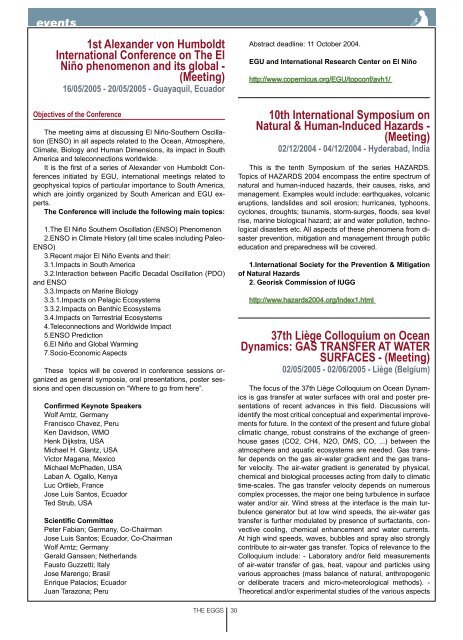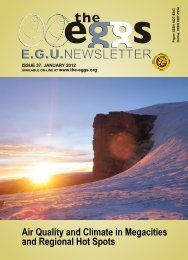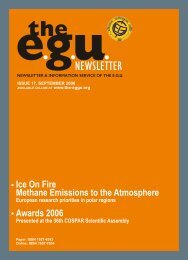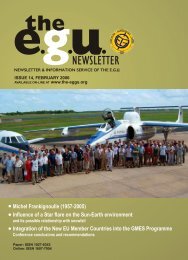Report on the Berlin 2 Open Access Conference - European ...
Report on the Berlin 2 Open Access Conference - European ...
Report on the Berlin 2 Open Access Conference - European ...
You also want an ePaper? Increase the reach of your titles
YUMPU automatically turns print PDFs into web optimized ePapers that Google loves.
1st Alexander v<strong>on</strong> HumboldtInternati<strong>on</strong>al C<strong>on</strong>ference <strong>on</strong> The ElNiño phenomen<strong>on</strong> and its global -(Meeting)16/05/2005 - 20/05/2005 - Guayaquil, EcuadorObjectives of <strong>the</strong> C<strong>on</strong>ferenceThe meeting aims at discussing El Niño-Sou<strong>the</strong>rn Oscillati<strong>on</strong>(ENSO) in all aspects related to <strong>the</strong> Ocean, Atmosphere,Climate, Biology and Human Dimensi<strong>on</strong>s, its impact in SouthAmerica and telec<strong>on</strong>necti<strong>on</strong>s worldwide.It is <strong>the</strong> first of a series of Alexander v<strong>on</strong> Humboldt C<strong>on</strong>ferencesinitiated by EGU, internati<strong>on</strong>al meetings related togeophysical topics of particular importance to South America,which are jointly organized by South American and EGU experts.The C<strong>on</strong>ference will include <strong>the</strong> following main topics:1.The El Niño Sou<strong>the</strong>rn Oscillati<strong>on</strong> (ENSO) Phenomen<strong>on</strong>2.ENSO in Climate History (all time scales including Paleo-ENSO)3.Recent major El Niño Events and <strong>the</strong>ir:3.1.Impacts in South America3.2.Interacti<strong>on</strong> between Pacific Decadal Oscillati<strong>on</strong> (PDO)and ENSO3.3.Impacts <strong>on</strong> Marine Biology3.3.1.Impacts <strong>on</strong> Pelagic Ecosystems3.3.2.Impacts <strong>on</strong> Benthic Ecosystems3.4.Impacts <strong>on</strong> Terrestrial Ecosystems4.Telec<strong>on</strong>necti<strong>on</strong>s and Worldwide Impact5.ENSO Predicti<strong>on</strong>6.El Niño and Global Warming7.Socio-Ec<strong>on</strong>omic AspectsThese topics will be covered in c<strong>on</strong>ference sessi<strong>on</strong>s organizedas general symposia, oral presentati<strong>on</strong>s, poster sessi<strong>on</strong>sand open discussi<strong>on</strong> <strong>on</strong> “Where to go from here”.C<strong>on</strong>firmed Keynote SpeakersWolf Arntz, GermanyFrancisco Chavez, PeruKen Davids<strong>on</strong>, WMOHenk Dijkstra, USAMichael H. Glantz, USAVictor Magana, MexicoMichael McPhaden, USALaban A. Ogallo, KenyaLuc Ortlieb, FranceJose Luis Santos, EcuadorTed Strub, USAScientific CommitteePeter Fabian; Germany, Co-ChairmanJose Luis Santos; Ecuador, Co-ChairmanWolf Arntz; GermanyGerald Ganssen; Ne<strong>the</strong>rlandsFausto Guzzetti; ItalyJose Marengo; BrasilEnrique Palacios; EcuadorJuan Taraz<strong>on</strong>a; PeruAbstract deadline: 11 October 2004.EGU and Internati<strong>on</strong>al Research Center <strong>on</strong> El Niñohttp://www.copernicus.org/EGU/topc<strong>on</strong>f/avh1/10th Internati<strong>on</strong>al Symposium <strong>on</strong>Natural & Human-Induced Hazards -(Meeting)02/12/2004 - 04/12/2004 - Hyderabad, IndiaThis is <strong>the</strong> tenth Symposium of <strong>the</strong> series HAZARDS.Topics of HAZARDS 2004 encompass <strong>the</strong> entire spectrum ofnatural and human-induced hazards, <strong>the</strong>ir causes, risks, andmanagement. Examples would include: earthquakes, volcanicerupti<strong>on</strong>s, landslides and soil erosi<strong>on</strong>; hurricanes, typho<strong>on</strong>s,cycl<strong>on</strong>es, droughts; tsunamis, storm-surges, floods, sea levelrise, marine biological hazard; air and water polluti<strong>on</strong>, technologicaldisasters etc. All aspects of <strong>the</strong>se phenomena from disasterpreventi<strong>on</strong>, mitigati<strong>on</strong> and management through publiceducati<strong>on</strong> and preparedness will be covered.1.Internati<strong>on</strong>al Society for <strong>the</strong> Preventi<strong>on</strong> & Mitigati<strong>on</strong>of Natural Hazards2. Georisk Commissi<strong>on</strong> of IUGGhttp://www.hazards2004.org/index1.html37th Liège Colloquium <strong>on</strong> OceanDynamics: GAS TRANSFER AT WATERSURFACES - (Meeting)02/05/2005 - 02/06/2005 - Liège (Belgium)The focus of <strong>the</strong> 37th Liège Colloquium <strong>on</strong> Ocean Dynamicsis gas transfer at water surfaces with oral and poster presentati<strong>on</strong>sof recent advances in this field. Discussi<strong>on</strong>s willidentify <strong>the</strong> most critical c<strong>on</strong>ceptual and experimental improvementsfor future. In <strong>the</strong> c<strong>on</strong>text of <strong>the</strong> present and future globalclimatic change, robust c<strong>on</strong>strains of <strong>the</strong> exchange of greenhousegases (CO2, CH4, N2O, DMS, CO, ...) between <strong>the</strong>atmosphere and aquatic ecosystems are needed. Gas transferdepends <strong>on</strong> <strong>the</strong> gas air-water gradient and <strong>the</strong> gas transfervelocity. The air-water gradient is generated by physical,chemical and biological processes acting from daily to climatictime-scales. The gas transfer velocity depends <strong>on</strong> numerouscomplex processes, <strong>the</strong> major <strong>on</strong>e being turbulence in surfacewater and/or air. Wind stress at <strong>the</strong> interface is <strong>the</strong> main turbulencegenerator but at low wind speeds, <strong>the</strong> air-water gastransfer is fur<strong>the</strong>r modulated by presence of surfactants, c<strong>on</strong>vectivecooling, chemical enhancement and water currents.At high wind speeds, waves, bubbles and spray also str<strong>on</strong>glyc<strong>on</strong>tribute to air-water gas transfer. Topics of relevance to <strong>the</strong>Colloquium include: - Laboratory and/or field measurementsof air-water transfer of gas, heat, vapour and particles usingvarious approaches (mass balance of natural, anthropogenicor deliberate tracers and micro-meteorological methods). -Theoretical and/or experimental studies of <strong>the</strong> various aspectsTHE EGGS 30





